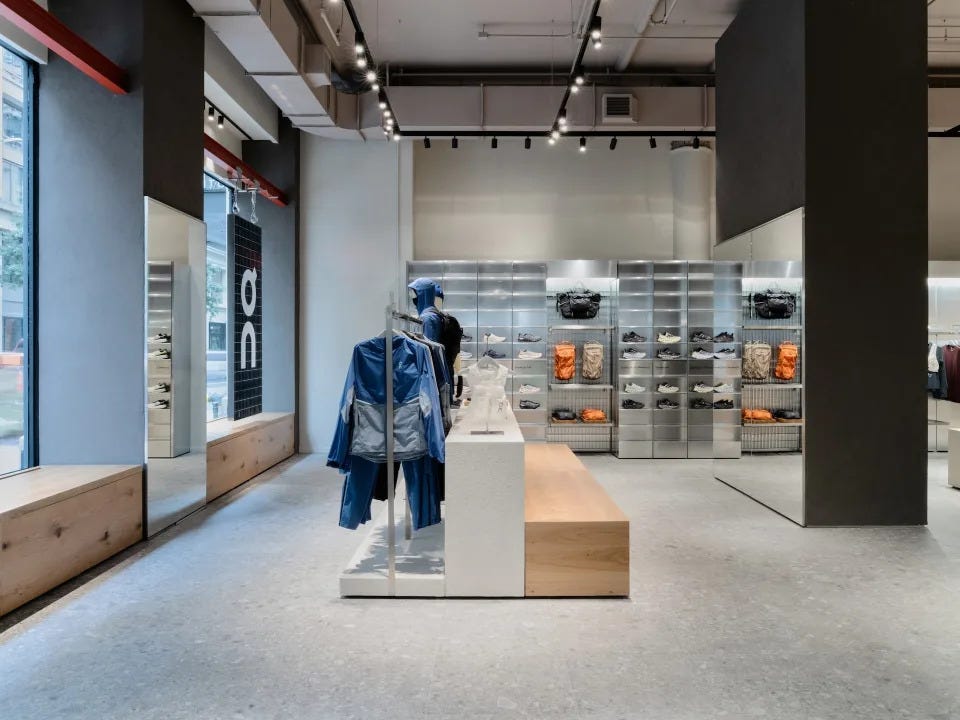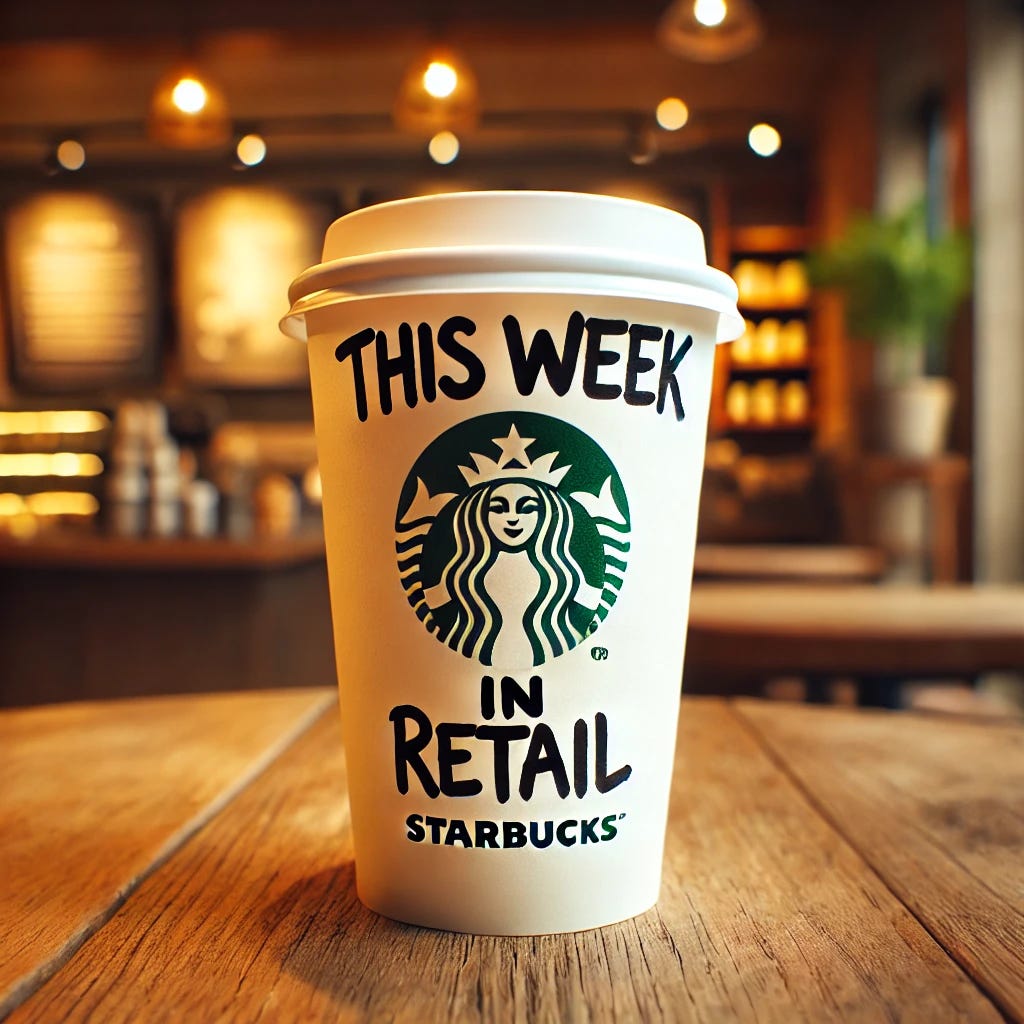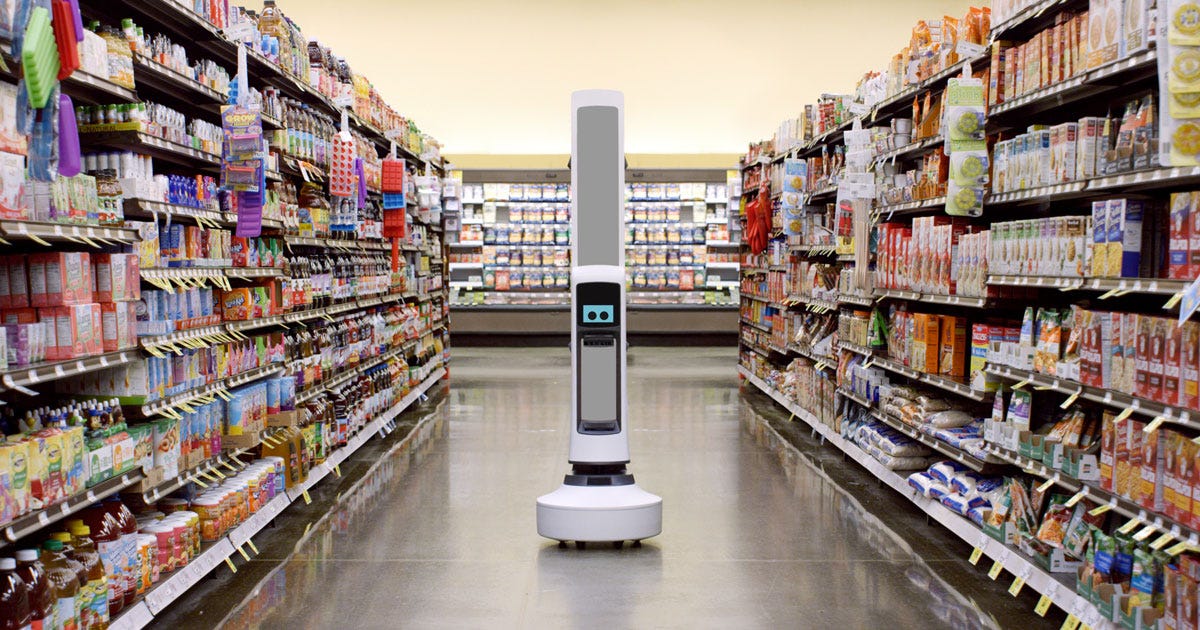This Week in Retail #50
Hey Friends,
The big five-0. What a week in retail it has been. For those that missed it, I published my annual holiday preview last Thursday, where I dig into my predictions for the holiday season, along with industry trends and try to capture all of the hoopla around the holidays.
Starbucks seems to always come up in the holiday retail news world, and the coffee giant is gearing up for the holiday season with new initiatives and collaborations. Beginning November 7, its seasonal menu and festive merchandise will be back in stores across the U.S.
Additionally, Starbucks has launched a limited-time partnership with Universal Pictures to celebrate the upcoming Wicked film. The collaboration introduces themed drinks inspired by the characters Glinda and Elphaba—like Glinda’s pink potion and Elphaba’s peppermint cold brew. This collection also includes Wicked-inspired drinkware and gift cards, adding a touch of Oz-inspired magic to the Starbucks lineup.
Starbucks is rolling out changes to enhance customer experience and speed of service in stores. A major return is the condiment bar, a self-service area with milk, sweeteners, and other add-ins that was removed during the COVID-19 pandemic. The condiment bar will be back in 2025, with the goal of simplifying orders for baristas and giving customers more control over their drinks. Starbucks CEO Brian Niccol noted that this shift aligns with customer preferences and helps baristas focus on faster, more consistent service
Starbucks is also bringing back Sharpies for writing customer names on cups. This tradition, paused in favor of stickers, adds a personal touch and helps create a more engaging in-store experience, reinforcing Starbucks' emphasis on quality and connection in their brand refresh. Alongside the return of the Sharpies, Starbucks is working on initiatives like a faster ordering experience and technology to streamline customizations, aiming to keep wait times under four minutes in all cafes
In some grocery news….Grocery chain Hy-Vee is scaling back self-checkouts at stores, favoring for more face-to-face interactions. The Iowa-based grocery chain, which has dozens of locations in Minnesota and nearly 300 locations across several states, is indeed scaling back or removing the machines altogether.
John Koryl departed from his role as CEO of luxury resale platform The RealReal, less than two years after assuming the position. His exit comes with no official reason provided by the company. Koryl had implemented a strategy focused on cost-cutting and prioritizing high-margin items—a marked shift from founder Julie Wainwright’s "growth at all costs" approach. Stepping into the CEO role is Rati Sahi Levesque, who co-founded The RealReal in 2011 and has held various leadership positions, including president and COO. Levesque had also served as interim co-CEO in 2022 following Wainwright’s departure, providing her with a strong foundation to lead the company as it aims to stabilize amid an evolving resale market.
Adidas has reached an out-of-court settlement with Ye (formerly Kanye West), officially ending their dispute following Adidas' decision to terminate the partnership in 2022 due to Ye’s alleged antisemitic and inappropriate conduct. Adidas CEO Bjorn Gulden confirmed the settlement, stating that “no money [is] going either way,” while noting the decision to avoid further litigation. Reports highlight Adidas' longstanding tolerance of Ye's misconduct, including offensive remarks and abusive behavior towards employees. Despite mounting internal concerns, Adidas maintained the partnership for nearly a decade due to the profitability of Yeezy products, which generated over $1 billion in annual sales. Moving forward, Adidas plans to sell remaining Yeezy inventory by the end of 2024.
Simbe Robotics, developer of the retail inventory robot Tally, recently secured $50 million in Series C funding led by Goldman Sachs. The funding will enable Simbe to enhance its technical and commercial capacities, particularly in product engineering, sales, and marketing.
Known for its work with grocery chains like Schnuck Markets and Albertsons, Simbe’s Tally robots roam store aisles autonomously, checking stock levels, updating prices, and assisting employees with more efficient restocking and order picking. Despite challenges in the robotics sector, such as cost reduction and task accuracy, Simbe's steady client growth (now partnering with 29 retail brands) and continued investment highlight the rising demand for automation in inventory management.
Swiss running shoe brand On has opened its first store in Chicago and its third in New York City, designed to capture the unique character of each city. The Chicago flagship, a 4,553-square-foot space on Rush Street, launched in time for the city’s marathon. Its design reflects Chicago's industrial heritage, featuring an open gray ceiling, colorful walls, and wood accents inspired by the city’s iconic bridges.

In New York, On’s latest and largest store spans 4,596 square feet in the Flatiron neighborhood at 162 Fifth Ave. Located in a registered 1930s landmark building, the design carefully preserves original architectural elements like columns and moldings while adding Swiss-inspired, nature-focused touches. Expansive windows enhance visibility, and the store’s interior pays homage to local runners’ connection to the urban landscape.
Both stores will regularly host On’s Run Club, along with events, group runs, and fitness sessions with local partners and ambassadors.
Some early reporting data coming from Amazon suggests it’s summer prime day event wa sa huge success. Amazon’s Q3 report shows strong growth across multiple segments, boosted in part by its summer Prime Day. Online store sales rose 7.2% year-over-year to $61.4 billion, and physical store sales increased 5.4% to $5.2 billion. The company's retail services also saw robust growth: third-party seller services grew 10.3% to $37.9 billion, advertising revenue rose 18.8% to $14.3 billion, and subscription services climbed 10.9% to $11.3 billion. Amazon Web Services (AWS) continued to support profitability, driving net income up by more than 55% to $15.3 billion.
The Container Store’s Financial Struggles: The Container Store has reported a 10.5% year-over-year sales decline in Q2 2024 and issued a “going concern” warning. The company faces critical financial hurdles, including a dependence on a $40 million investment from Beyond, the parent company of Bed Bath & Beyond. If the deal or other refinancing options fall through, The Container Store may have to consider bankruptcy. Ongoing challenges include weakened consumer spending in the storage and organization sector, leading to reduced in-store and online sales. The company’s recent efforts to stabilize include a reverse stock split, layoffs, and adoption of a poison pill strategy to limit external stockholder influence.
Franchise Group, which owns brands like Pet Supplies Plus and The Vitamin Shoppe, has filed for Chapter 11 bankruptcy, citing $2 billion in debt. The company will wind down its struggling American Freight business, attributing its issues to inflation and weak demand for durable goods. Franchise Group, which went private in 2022 in a $2.6 billion deal led by then-CEO Brian Kahn, has faced further complications due to fraud allegations against Kahn. The company has secured $250 million in debtor-in-possession financing to maintain operations and has a restructuring support agreement with debt holders, which will see first-lien debt converted to equity in the reorganized business.
The Children’s Place and Shein Partnership: In a strategic move to increase its digital reach, The Children’s Place has launched a storefront on fast-fashion giant Shein’s platform. The partnership allows The Children’s Place to market its products to Shein's extensive user base, potentially broadening its audience. This follows a year of restructuring for The Children’s Place, which has faced declining sales, investor-driven strategic shifts, and the recent exit of longtime CEO Jane Elfers. Now led by interim head Muhammad Umair from Mithaq Capital, The Children’s Place has cut back on unprofitable promotions and e-commerce costs, citing improved profitability despite overall revenue decline.
Primark is expanding into Texas with its first store opening at La Plaza shopping center in McAllen on December 12, 2024. This 37,000-square-foot store will mark the budget retailer’s entry into the Texas market and increase its U.S. presence to 29 stores across 12 states. Texas, being one of the fastest-growing states, represents a strategic growth opportunity for Primark, with the La Plaza location also positioned to attract customers from nearby Mexico.
Additional Texas stores are planned for North East Mall in Hurst, Willowbrook Mall in Houston, Cielo Vista Mall in El Paso, and Katy Mills in Houston, adding another 70,000 square feet of retail space and bringing the total new Texas locations to five. These stores will offer Primark’s range of fashion, homeware, and beauty products.
Primark recently introduced the Durability Framework, aimed at improving clothing longevity as part of its sustainability efforts, developed in collaboration with industry groups and the University of Leeds. The retailer reported a 0.9% decline in like-for-like sales for Q4 this year.
That;s all folks….have a great week.




